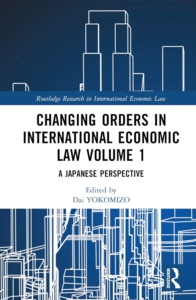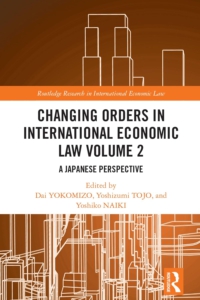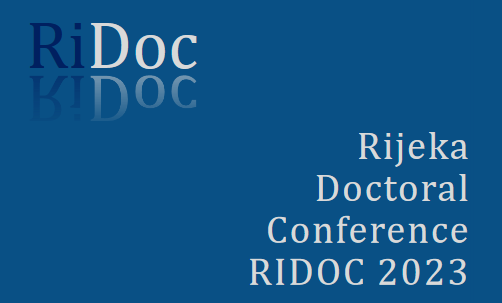Views
HCCH Revised Draft Explanatory Report (version of December 2018) on the Judgments Convention is available on the HCCH website
A revised Draft Explanatory Report (version of December 2018) on the HCCH Draft Convention on the Recognition and Enforcement of Foreign Judgments in Civil or Commercial Matters is available in both English and French on the Hague Conference website.
In my opinion, particularly complex topics in this Draft Explanatory Report include intellectual property (IP) rights (in particular, Art. 5(3) of the draft Convention– there are several provisions dealing with IP rights in addition to this Article) and the relationship of the draft Convention with other international instruments (Art. 24 of the Draft Convention). Some of the text is in square brackets, which means that such text has tentatively been inserted due perhaps to a lack of consensus at the Special Commission meetings, and thus a final decision will be taken at the Diplomatic Session scheduled for the summer 2019.
With regard to intellectual property rights, the draft Convention distinguishes between IP rights that require to be granted or registered (such as patents, registered trademarks, registered industrial designs and granted plant breeders’ rights) and those that do not require grant or registration (i.e. copyrights and related rights, unregistered trademarks, and unregistered industrial designs – this is a closed list for these specific rights). See paragraph 238 of the Draft Explanatory Report.
The draft Convention’s approach to IP rights, which is based on the territoriality principle, is set out very clearly in paragraph 235 of the Draft Explanatory Report. In particular, the draft Convention reflects a compromise according to which the State of Origin of the judgment will coincide with the lex loci protectionis i.e., the law of the State for which protection is sought, so as to avoid the application of foreign law to these rights (see also paragraph 236).
With respect to the relationship of the draft Convention with other international instruments, it is important to note that this draft Convention will cover, among many other things, non-exclusive choice of court agreements so as to give preference to the application of the HCCH Hague Convention of 30 June 2005 on Choice of Court Agreements to exclusive choice of court agreements. See paragraphs 220-225 and 410-430 of the Draft Explanatory Report.
The latest information about the Judgments Project is available here.
After the Romans: Private International Law Post Brexit
Written by Michael McParland, QC, 39 Essex Chambers, London
On 10 December 2018 the Ministry of Justice published a draft statutory instrument with the pithy title of “The Law Applicable to Contractual Obligations and Non-Contractual Obligations (Amendment etc) (EU Exit) Regulations 2018”. This indicates the current intended changes to retained EU private international law of obligations post Brexit. Read more
The renaissance of the Blocking Statute
Written by Markus Lieberknecht, Institute for Comparative Law, Conflict of Laws and International Business Law (Heidelberg)
Quite a literal “conflict of laws” has recently arisen when the EU reactivated its Blocking Statute in an attempt to deflect the effects of U.S. embargo provisions against Iran. As a result, European parties doing business with Iran are now confronted with a dilemma where compliance with either regime necessitates a breach of the other. This post explores some implications of the Blocking Statute from a private international law perspective. Read more
News
Out Now: Dai YOKOMIZO, Yoshizumi TOJO, Yoshiko NAIKI (eds.), Changing Orders in International Economic Law: A Japanese Perspective, Vol. 1 and Vol. 2, Routledge, 2023.
These two volumes celebrate the 30th anniversary of the Japan Association of International Economic Law (JAIEL), which was founded in 1991. The Volumes include 30 contributions written by eminent Japanese scholars from different background, in particular, private international law, public international law, international economic law, competition law, intellectual property law etc.


Seminar information: U.S Extraterritorial Jurisdiction– Myths and Reality
Professor William S. Dodge, John D. Ayer Chair in Business Law; Martin Luther King Jr. Professor of Law, University of California, Davis, School of Law, will give a seminar entitled ‘U.S. Extraterritorial Jurisdiction-Myths and Reality’ at the Wuhan University School of Law on 15 Oct. at 15:00-16:30pm Beijing Time. This seminar will be chaired by Professor Sophia Tang, the Associate Dean of the Wuhan University Academy of International Law and Global Governance. Associate Professor Wenliang Zhang at the Renmin University, Associate Professor Xiongbin Qiao, Associate Professor Yong Gan, and Associate Professor Wenwen Liang at the Wuhan University will act as discussants. You can attend the seminar online through Tencent Meeting. Please follow the information below:
Time?2023/10/15 15:00-17:00 (GMT+08:00) Beijing Time
Meeting link?
https://meeting.tencent.com/dm/KADluwLhfmfc
Tencent Meeting ID: 991-898-184
Password: 89456
Call for abstracts: RIDOC 2023 Rijeka Doctoral Conference
A Friday in early December is reserved for RIDOC: Rijeka Doctoral Conference, organised by the University of Rijeka, Faculty of Law. Doctoral students in law or law-related area who wish to join colleagues from different countries to test their research hypothesis and arguments before the expert panel are welcome to apply for the 2023 edition.
The call is open until 20 October and abstracts should be sent to ridoc@pravri.uniri.hr. More information is available here.



